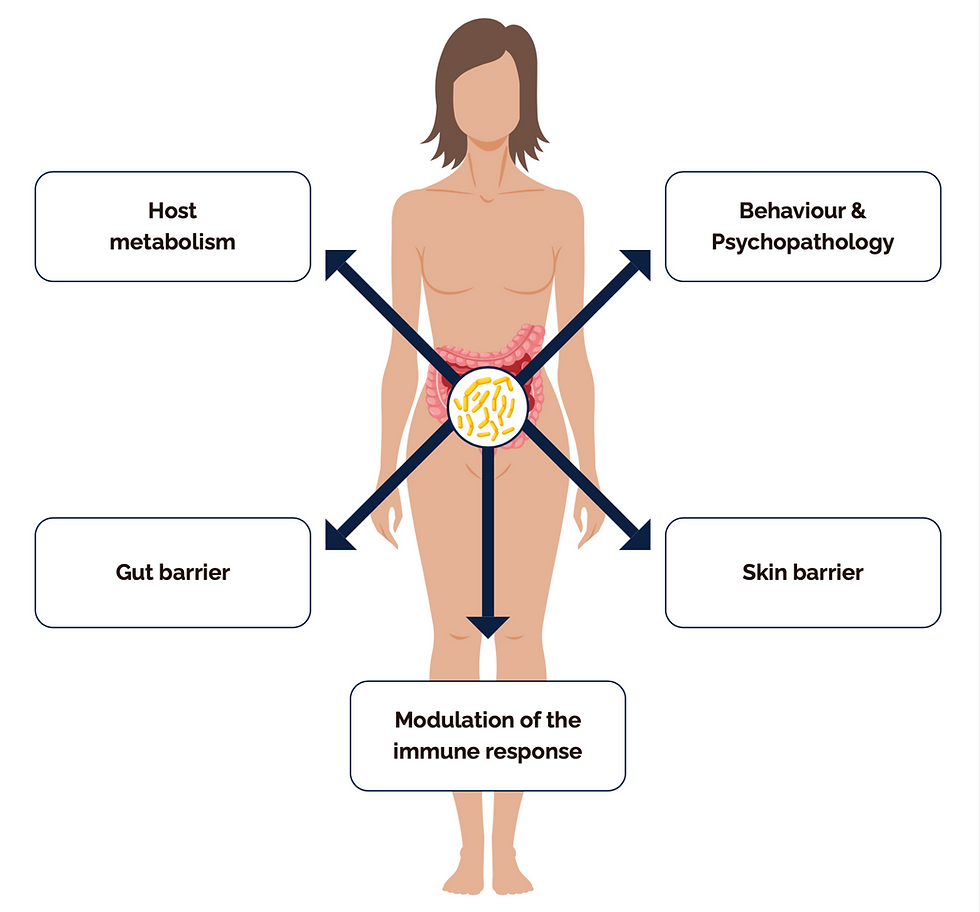Gut Microbiome and Health
- Rita Soares

- Jan 8, 2025
- 3 min read
The human gut has an approximate surface area of 200 to 300 m2 and hosts ten trillion of several types of microbes (including bacteria, archaea, eukarya, viruses and parasites), known as the gut microbiota. The microbiota is ten times more abundant than our somatic and germ line cells of the body. The collective genes of the microbiota are known as the ‘microbiome’ which is 150 times larger than the human genome.

In our body, 90% of all microorganisms are located in the initial sections of the small and large intestines. The gastrointestinal tract is divided functionally and anatomically into the stomach, small and large intestine. The distinct microenvironment and physiochemical barrier of each compartment selects the growth of specific microbiota.
Role of Intestinal Microbiota on Health
The intestinal microbiota, which refers to the diverse community of microorganisms residing in the gastrointestinal tract, plays a crucial role in maintaining health and supporting various physiological functions.
Some of the functions of the gut microbiota are:
Digestion and Nutrient Absorption -The microbiota contributes to the digestion of certain dietary components, such as complex carbohydrates, that human enzymes alone cannot break down. Fermentation by gut bacteria produces short-chain fatty acids (SCFAs), which serve as an energy source for the cells lining the colon and play a role in maintaining gut health.
Synthesis of Essencial Nutrients - Some gut bacteria are involved in the synthesis of certain vitamins, such as B vitamins and vitamin K, which are essential for various physiological processes. These synthesized vitamins contribute to the host's overall nutritional status.
Metabolism and Energy Regulation - The gut microbiota is involved in the metabolism of dietary components, influencing energy extraction from food. Changes in the composition of the microbiota have been linked to metabolic disorders, including obesity and insulin resistance.
Maintaining Intestinal Barrier Integrity - The microbiota contributes to the maintenance of the intestinal barrier, which prevents the entry of harmful substances into the bloodstream. Disruption of the intestinal barrier can lead to increased permeability (leaky gut), potentially contributing to inflammation and various health issues.
Protection Against Pathogens - A healthy microbiota provides a protective barrier against harmful pathogens by occupying available niches and competing for resources. Beneficial bacteria can produce antimicrobial substances that inhibit the growth of pathogenic microorganisms.
Immune System Function and Development - The gut microbiota plays a critical role in the development and maturation of the immune system, particularly during early life. It helps train the immune system to distinguish between harmless substances and potential threats, reducing the risk of inappropriate immune responses.
Gut-Brain Axis - The gut-brain axis is a bidirectional communication system between the gut and the central nervous system. The microbiota plays a role in this communication. Alterations in the gut microbiota have been associated with mood disorders, such as depression and anxiety.
Anti-inflammatory Effects - Beneficial bacteria in the gut can produce anti-inflammatory molecules, helping to modulate the immune response and prevent excessive inflammation. Chronic inflammation is associated with various diseases, and a balanced microbiota may contribute to immune system regulation.

The gut microbiota plays a crucial role in maintaining various aspects of health, and alterations in its composition (know as dysbiosis) have been associated with a range of health problems.
Health problems associated with changes in the gastrointestinal microbiome:
Gastrointestinal Disorders ( Irritable bowel disease, Crohn's disease, Ulcerative colitis, Inflammatory bowel syndrome)
Autoimune Diseases
Allergies and Asthma
Mood Disorders (Anxiety and Depression)
Liver Diseases (Non-alcoholic Fatty Liver Disease)
Increased susceptibility to Infections
Neurological Conditions (Parkinson's and multiple sclerosis)
Gut Microbiome and Health
Maintaining a healthy and diverse gut microbiota is crucial for overall well-being. Lifestyle factors, including diet, exercise, and avoiding unnecessary antibiotic use, can influence the composition and balance of the intestinal microbiota.




Comments